Questionthis afternoon i came home and went to see my lovies. i counted four of them standing on a perch,, and one in the corner. i looked closely and saw blood and feathers. the baby lovie was not moving. i noticed that it was the youngest one. i think that the hen, whom i call Liang, bit it to death. i removed Liang to another cage because I'm afraid that she will bite others to death also. i cannot put Ming, the male, with the baby lovies either, because it's sick(but getting better). what should i do now? there isn't a lovie to feed the babies, and i cant handfeed them because I'm away for the day. i don't get home till 4:50 PM. (these babies are five/ six weeks old, as I've told you before) i really don't want the babies to die. PLEASE REPLY ASAP, ASAP!
-------------------------------------------
The text above is a follow-up to ...
-----Question-----
my pair of lovebirds recently had babies, and I've removed the nestbox from the cage, since one of my friends told me. the female bites the male's feet and pecks at it. the female seems like she does not want him near the babies. his feet sometimes bleed and there are brownish patches on them. I've also seen him bite his own feet. i need to know if he's sick and if i should bring him to an avian vet. I've removed the male to a separate cage.
another thing: i DO NOT handfeed my baby lovies, because I've never done it before and i don't want them to die. i have four baby lovebirds now, since three of them died. this is the first time the pair has produced lovebirds. the babies are about 5/6 weeks old. should i do anything extra, since the parents take care of everything? i want them to be tame. last time i took them out, they were flying everywhere, and i could not catch them. they jump at the sight of me and my hand. PLEASE HELP! ADVICE IS GLADLY ACCEPTED.
-----Answer-----
OK, let's see if we can put this in perspective together and work through it.
Breeding birds is a lot more complicated than just letting them do their thing (as you're finding out the hard way). Their nutritional needs are very different both for mating/sitting on their nest and for when the chicks hatch. A proper amount of space needs to be provided and they have to be monitored for health and stress, both of which play a factor in the chicks' survival.
Normally, the male should be left there since it's a partnership and both parents feed the young as well as each other. When you remove him, stress levels increase and possibly aggression.
The feet picking may be out of stress, lack of nutrients or even parasites (or any combination). Sometimes other diseases present with this symptom as well.
It's very wise of you to not hand feed without knowing exactly what you're doing. Though once learned it's pretty easy, it does take practice and I admit even now I'm hesitant to care for birds as small as lovies. Give me a big ol' macaw any day!
Though you don't hand feed, you can still interact regularly from when they hatch. Let them see you and from about 10-14 days old, reach your hand in and touch the tops of their heads/beaks - talk to them and let them see & hear you as the parents are feeding them.
As they fledge, increase your interaction and when they're old enough you can offer them formula from a small (baby) spoon. The handfeeding formula from any pet store will work - and it's as simple as putting a few drops (or 'plops' actually) at the tip of the spoon and holding it to them - they'll do the rest.
Since these chicks are older already - you may want to wean them from their parents into a separate cage. Once there you can try the typical 'taming' methods.
I've outlined them at my page (I don't have room here) so give me a look www.geocities.com/animalrelief_info
- or through our main site and click on birds -
www.4AnimalCare.org
We also address nutrition
Now - finally, as for the bitten birdie feet - yes, I would absolutely take him in to be seen and evaluated.
Many avian vets make housecalls these days, so look into that too. It's actually often very reasonable in price since they'll usually look at everyone and everything, evaluating your set up and clipping wings/nails - the usual good stuff. It also doesn't stress the bird out.
We have our birds checked in well-bird visits twice a year just to keep their records current and to always have someone 'on call' if there's an emergency. Sort of like their food, we just figure it into the bird care budget. The peace of mind and healthy birds are soooo worth it.
Get back to me and let me know how you do ok? How the birds make out.
God bless,
AnswerAt this age your babies should be weaning anyway and not needing hand feeding. Remove them ALL to their own private cage - they'll keep each other warm.
You can offer them some baby bird food formula off a spoon in the morning and again at night, with the proper foods left for them while you're gone.
Go here to find out the details (it'll be further down the page when you get there) http://www.parrotparrot.com/lovebirds/handfeed.htm
The instructions are pretty detailed and should guarentee the survival of your little ones.
It would be very wise of you to not encourage breeding anymore. This is terribly stressful not just on the birds, but on you too.
Many people don't have great outcomes - so don't blame yourself - a lot of room and careful training is necessary to do this successfully.
Good luck and God bless you and your flock

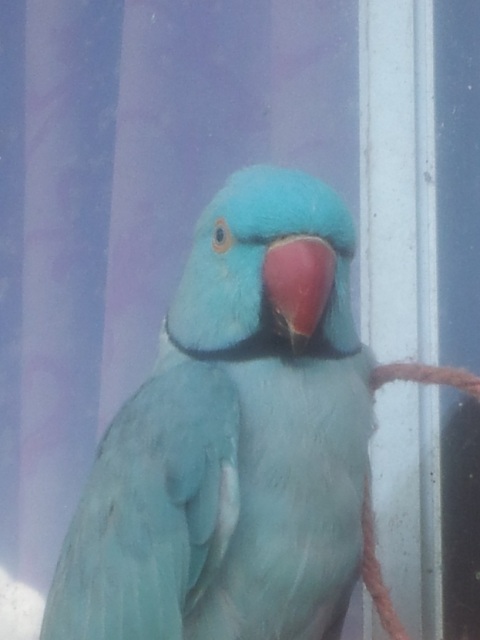 RE: Indian Ringneck probems
Question
Indy our Ringneck
Thank you for your he
RE: Indian Ringneck probems
Question
Indy our Ringneck
Thank you for your he
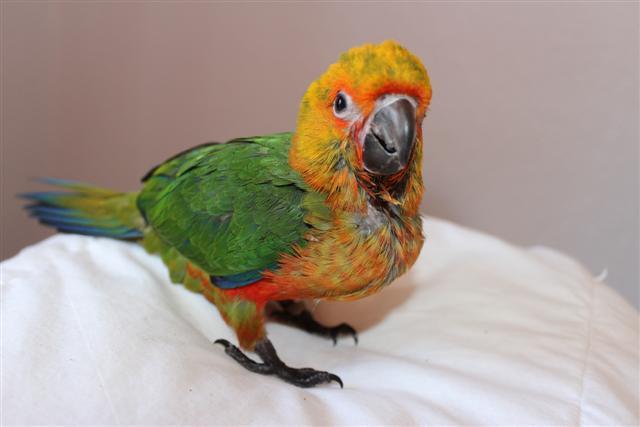 Jenday Conure Weaning?
Question
Castor the Conure
Hi
I have a 9 week o
Jenday Conure Weaning?
Question
Castor the Conure
Hi
I have a 9 week o
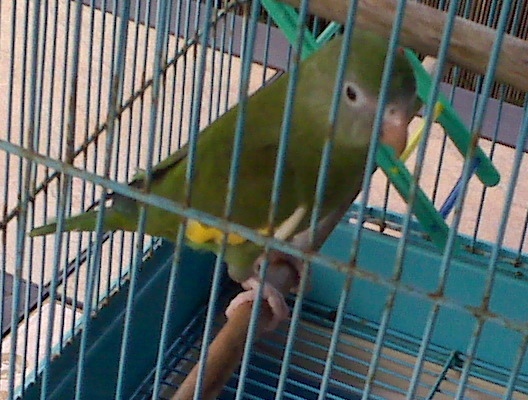 What type of parrot is this?
Question
Friendly bird
A week ago ths small parrot flew
What type of parrot is this?
Question
Friendly bird
A week ago ths small parrot flew
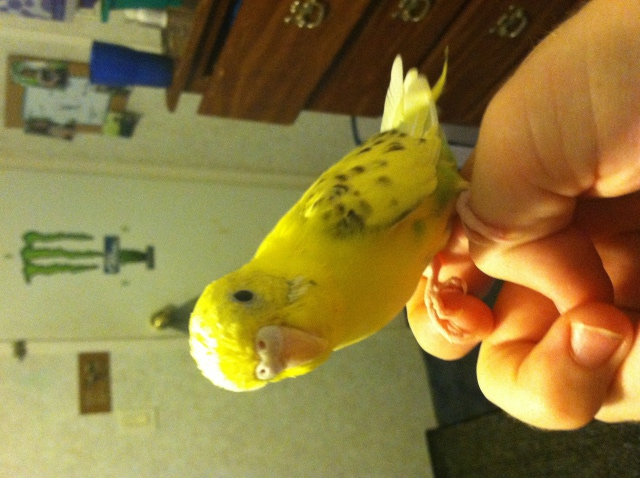 Parakeet gender
Question
Parakeet
Hi, I looked for an expert und
Parakeet gender
Question
Parakeet
Hi, I looked for an expert und
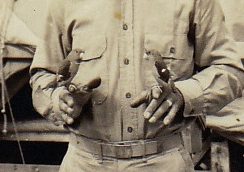 ID Birds
Question
Panama Birds
My uncle served in Panama in 1941
ID Birds
Question
Panama Birds
My uncle served in Panama in 1941